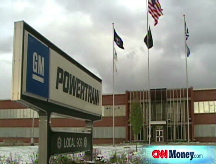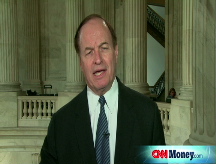The Big Three Depression risk
Some fear a loss of GM, Ford and Chrysler would take U.S. into another depression. Even if that doesn't happen, a major auto failure would clearly hurt.
NEW YORK (CNNMoney.com) -- The U.S. auto industry weathered the Great Depression. But there are some fears that its current crisis could cause another one.
During a hearing on a proposed $25 billion federal bailout of the industry Wednesday, GM CEO Rick Wagoner used the D word to describe what might happen if Congress didn't approve some sort of rescue package.
"At this point without injections of liquidity, I think it's reasonably probable that some portion if not all of the domestic industry will not survive," Wagoner said. "The way I would explain it to your constituents is it's going to prevent the United States from entering into an economic depression in my view."
Of course, Wagoner and the other automaker executives have an interest in painting a worst-case scenario when asking for a federal bailout.
But the threat of a recession turning into a depression was echoed by Columbia University professor Jeffrey Sachs, who also testified at Wednesday's hearing.
Sachs said that those who argue that a bankruptcy of GM or Chrysler would be better for the economy in the long term should look no further than the damage from the bankruptcy of Lehman Brothers in September.
"Lehman Brothers triggered the biggest worldwide crisis in generations," Sachs said. "Don't do it again with this industry. Two in a row, we're really into [a] depression."
Are Wagoner and Sachs justified in their depression warning? That's tough to say. But the failure of GM and one or more of its Big Three rivals would be an unwelcome blow to an already staggering U.S. economy.
There is no clear definition of what separates a recession from a depression but even if all three large U.S. automakers go out of business, it's unlikely that economic conditions would immediately look like the early 1930s.
Back then, unemployment hit 25% in 1933 and gross domestic product, the broadest measure of economic activity, plunged 13% in 1932.
By way of comparison, the unemployment rate is currently 6.5%. And according to the Federal Reserve's latest economic forecasts, while the central bank believes that GDP could decline in 2009, it is predicting a drop of no worse than 0.2%.
Still, other economists say that there would be a sudden loss of a million jobs or more, which could take place if GM and Chrysler were forced out of business.(Ford Motor (F, Fortune 500) CEO Alan Mulally has maintained that his firm doesn't face an immediate threat of running out of cash.)
GM has about 120,000 U.S. employees, while Chrysler has about 66,000. Those two have more than 10,000 U.S. dealerships between them, employing about 500,000.
In addition, more than 300,000 jobs at auto parts suppliers are directly tied to the purchases by those two companies alone. So the direct job losses of having those two companies halt operations would top a million rather quickly.
Throw in a closure at Ford Motor, and the direct job losses reach about 1.6 million.
Lakshman Achuthan, managing director of the Economic Cycle Research Institute, estimates that if 2 million jobs are lost in the next six months, it would represent a loss of almost 1.5% of the job base. That's a big bite to take out of the economy in such a short period. The last time it lost such a large percentage of its jobs that quickly was during the painful recession of 1982.
But Achuthan points out that the the economy has lost more than 1.5% of its jobs base over a six month period four times since the end of World War II, and none of those increases in joblessness caused a depression.
Still, Achuthan is in favor of a bailout for the Big Three and said it would help save jobs.
"Forget about the semantics of depression, it makes no sense to accept that size of job losses when the economy is falling off the cliff," he said.
Other economists argue that an automaker would be able to function in bankruptcy, which would limit the impact to the overall economy somewhat. Yet, there is little doubt that deep job cuts are ahead in the next year, regardless of what happens in Congress.
"You're going to lose jobs in the auto sector, it's just a question of how many," said David Wyss, chief economist with Standard & Poor's, one of those who thinks that the automakers might be able to stay in business using Chapter 11.
Wyss thinks the impact of a liquidation of GM and Chrysler could be limited if the auto plants operated in the United States by Ford pick up some of the slack.
"Americans will buy about the same number of cars, no matter who sells them," he said. "It could even be the best thing for Ford if GM is out of business."
But Wyss added that if GM and Chrysler disappear, there could also be an increase of about 1 million imported cars every year, which would remove about $25 billion from the U.S. economy. That would be enough to shave 0.2 percentage points off the nation's GDP. And that's not even counting the impact of lost jobs and wages.
"That's not trivial," he said.
For this reason, he also thinks that a bailout might make sense, even if it doesn't solve Detroit's long-term problems.
"I have a hard time seeing how a bailout fixes GM. As an economist, I hate it," he said. "But it may be a case where paying to delay the inevitable may be worthwhile."
Finally, the biggest threat to the economy from widespread auto failures is the unanticipated consequences, things that can not be forecast with any certainty such as how many more people would lose their homes, how much more home prices would fall and how many more bank failures could occur as a result.
"I don't see unemployment getting to 10% just because of the failure of automakers," Wyss said. "But it's hard to say we won't get to that level because other things will happen." ![]()



